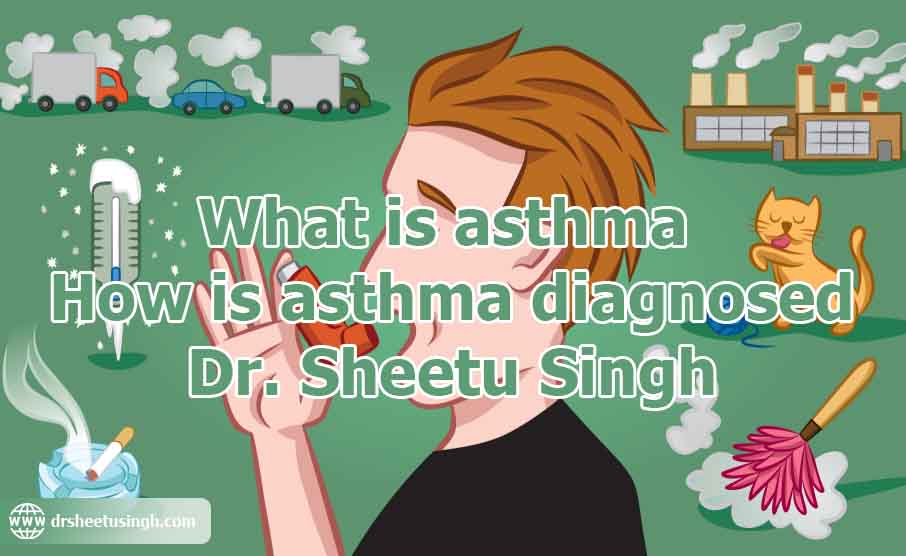What is Asthma and how is it Diagnosed?

Many cells and cellular factors play a part in this chronic inflammatory condition of the airway. Chronic inflammation is associated with airway hyperresponsiveness which is responsible for chest tightness, wheezing, and coughing, particularly at night or in the early morning. What is asthma, These article are associated with widespread but variable airway obstruction within the lung that is often reversible either spontaneously or with treatment.
Symptomatic asthma – PFT, Asymptomatic – provocation challenge test Symptoms: episodic breathlessness, chest tightness, wheezing, cough – incited with allergen exposure, seasonal variation. There is a family history of asthma and allergy. History of variability in symptoms. Physical examination – wheezing may be present, silent chest in severe asthma,
Lung Functions – FEV1, FVC, PEFR
PEFR – 1. Confirm diagnosis of asthma (>20% or >60l/min improvement post-bronchodilator or diurnal) 2. For monitoring and control.
Methacholine challenge test/ histamine challenge test/ mannitol/exercise challenge test (sensitive test – negative test rules out asthma, false-positive – allergic rhinitis, CF, bronchiectasis, COPD)
- Sputum eosinophilia, Feno
- Total Ig E – not diagnostic of atopy
- SPT – low cost and high sensitivity through false positive is high
- Rule out DD –
- FOREIGN BODY INHALATION
- VOCAL CORD DYSFUNCTION
- LVF
- COPD
- CF/BRONCHIECTASIS
How do u assess the severity
Controlled
(ALL MEASURES)Partly controlled
(1-2)Uncontrolled Daytime symptoms <2 /week 3 OR MORE Limitation of activity None Nocturnal awakening None Need for reliever <2 /week FEV1 N <80%
Assessment of future risk –
- Poor control of symptoms
- Frequent exacerbations
- ICU admissions
- Low FEV1
- Cigarette smoke exposure
- High dose medications
Old classification of patients – intermittent, mild persistent, moderate persistent, severe persistent
It is not only the severity of symptoms but its responsiveness to treatment.
What is an asthma attack?
Many patients have stable disease and they are relatively free of symptoms. But whenever they come across trigger factors they develop an increase in their symptoms.
Asthma attack comprises the episode of progressive increase in breathlessness, cough, chest tightness, and wheezing. Treatment comprises repeated doses of rapid-acting bronchodilators, systemic steroids, and oxygen if required. Milder exacerbations can be treated in community settings
What causes these symptoms?
Asthma is an inflammatory disease with the involvement of airway cells (like mast cells, eosinophils, t lymphocytes, and dendritic cells) and structural cells (airway epithelial, endothelial cells, smooth muscle cells). Chemokines, cysteinyl leukotrienes, cytokines, histamine, and NO are mediators that act on these cells.
Airway narrowing is caused due to – smooth muscle contraction, airway edema, mucus hypersecretion, airway remodeling.
What signs tells a person that asthma is worsening ?
- Breathlessness
- Talks in
- Alertness
- Wheeze
- Respiratory rate
- Accessory muscles of respiration
- Pulse
- Pulsus paradoxus
- PEFR
- SpO2
- PaO2
- PaCO2
Dr. Sheetu Singh is the best Asthma Specialist Doctor in Jaipur.
